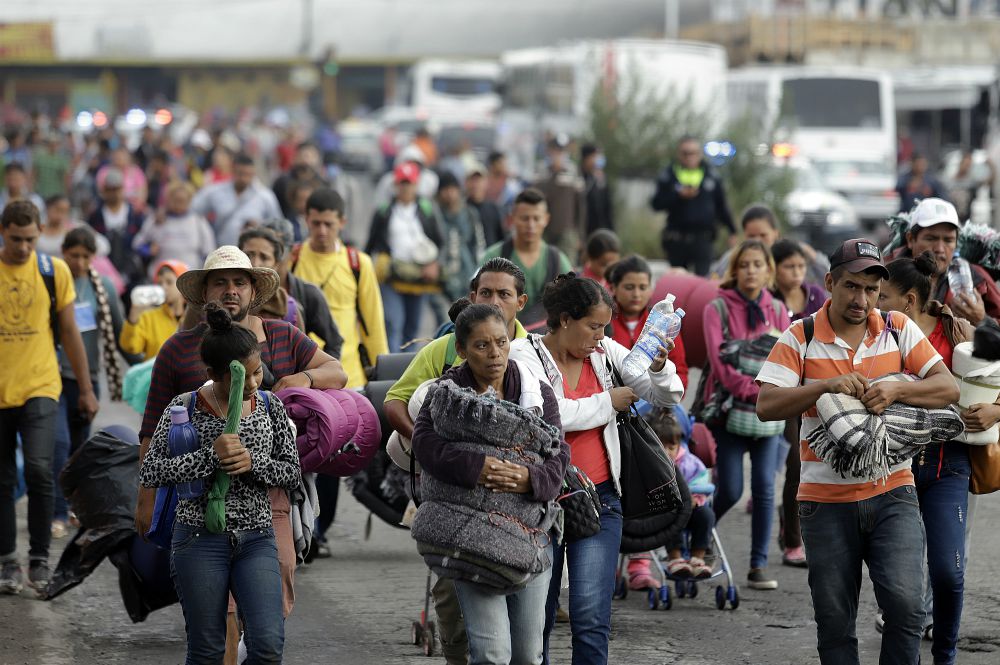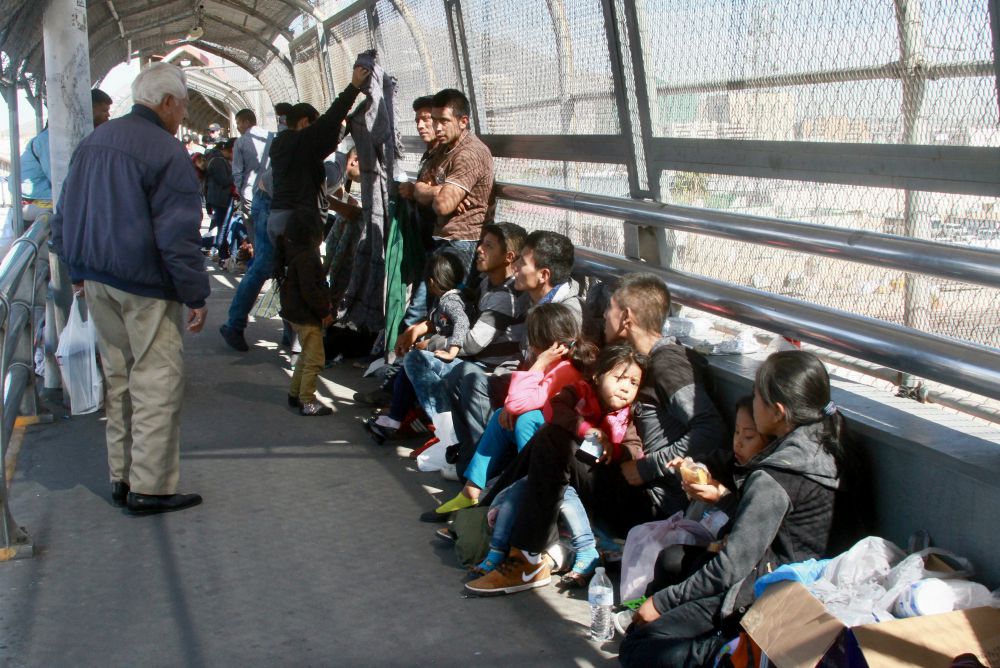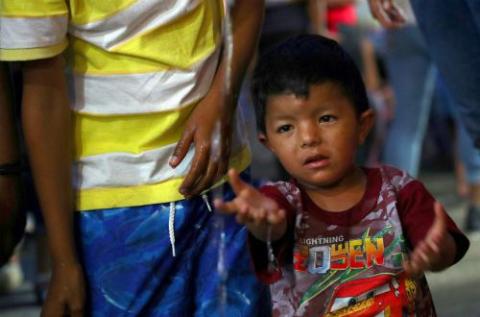
Migrants, part of a caravan traveling from Central America to the United States, arrive at Nov. 4 at the Church of the Assumption in Puebla, Mexico. (CNS/EPA/Hilda Rios)
In an ideal world, members of a migrant caravan traveling from Honduras would probably grant President Donald Trump's wish that they stay home. But conditions in much of Central America are far from ideal.
"People aren't leaving here because they want to," said Fr. Daniel St. Laurent, a priest from the Diocese of Manchester, New Hampshire, who serves the chaplain at the Juticalpa Campus of the Catholic University of Honduras. "Nobody wants to leave their homeland. Nobody wants to leave their culture. Nobody wants to leave their family. It's something they're forced to do."
Nathanael Bacon, a Catholic deacon who lives in Guatemala, caught up with the caravan while it was stopped in Huixtla, Mexico, in the southern part of Chiapas state, less than 30 miles from the Guatemalan border. Many caravan members told him they hadn't been able to make ends meet in their home countries due to low wages, extortion or unemployment. He met one couple who were missing their daughter's first birthday after fleeing extortion in their home country, fearful for their lives, and leaving the baby with her grandparents.
Poverty and violence came up over and over again as faith leaders with ties to Central America and Mexico discussed the factors driving the caravan of thousands of migrants traveling on foot from Honduras and currently located in southern Mexico.

Central American migrants wait Oct. 29 to cross the Santa Fe Bridge, an international bridge from Mexico to El Paso, Texas, to request asylum in the U.S. (CNS/Courtesy of Luis Hernandez)
While they called on Trump and other U.S. officials to stop using the caravan as a political pawn, ensure due process for asylum seekers and treat all migrants with respect, people of faith also said U.S.-based responses aren't enough.
For Central Americans to remain in their home country, they said, the U.S. needs to recognize how it has contributed to instability, violence and poverty in the region and take steps to address those root causes of migration.
"As a country, we should be much more compassionate but also smarter," said Bacon, who works with InnerCHANGE, an ecumenical Christian order that cares for the poor. "We're so uncreative, building up systems that only benefit security firms, the apparatus in the detention centers. If we could reinvest that in a way that's creative and compassionate, we might be able to reduce the number of folks that are forced to migrate."
The loosely organized caravan that left San Pedro Sula, Honduras, as a group of about 160 migrants Oct. 12 grew as it traveled through Honduras and Guatemala and more Central Americans, mostly Hondurans, Salvadorans and Guatemalans, joined.
Migrants who choose to band together in caravans usually do so because of the safety that publicity and large numbers bring, said Rev. Dori Hjalmarson, a mission co-worker for Presbyterian World Mission in Honduras. "I've actually witnessed a few of the stops … and it's not a safe journey, so the idea [is] to go with a large group of people whose leaders aren't really trying to extort you like a coyote would."
The caravan had swelled to over 7,000, according to a United Nations estimate, by the time it reached Mexico Oct. 22, but shrunk to around 3,600 people by Oct. 24, according to the Mexican government, after thousands decided to return home or apply for asylum in Mexico. BBC estimated the original caravan at around 5,000 Nov. 5, with two smaller caravans following.
While it's unclear how large the caravan will be by the time remaining migrants make the weeks-long journey to the U.S.-Mexico border, its significance is more symbolic than numerical, said Dan González Ortega, a Presbyterian pastor and rector at the Comunidad Teológica de México in Mexico City.
Supplies and spiritual support
González is working with other faith-based groups in Mexico to gather needed supplies and prepare spiritual support for the caravan. While the caravan is highly visible, he said it "isn't an exorbitant number of people" compared to normal migration flows. "Mexico is a generous country," González said. Regular citizens will "receive the caravan with an embrace."
Ahead of the midterm elections Nov. 6, Trump had portrayed the caravan as an invasion and the general situation on the U.S. border as a crisis. But while border apprehensions have increased since last fiscal year to nearly 400,000, that number is still low compared to the historical norm; apprehensions reached over 1,643,673 in 2000 and never dropped below 600,000 between 1976 and 2008.
Advertisement
What has changed is the kinds of people who are migrating. While Mexican men looking for work used to be the norm, Vox reported Oct. 23 that this September, for only the second time on record, families and children made up over half of those apprehended at the border. These families and children are more often Central American asylum seekers who can't legally be deported without a chance to defend their claim to stay.
The current administration has portrayed the majority of asylum claims as fraudulent and has sought to curtail successful claims, including by ruling out asylum for most victims of domestic or gang violence and deterring claims through increased detention and family separation.
While recognizing that some members might legally have to be admitted as asylum seekers, Trump has responded aggressively to the caravan, sending over 5,000 troops to the border, threatening to withhold aid from countries that don't stop the caravan and portraying migrants as dangerous and frightening. He also vowed to detain asylum seekers in tent cities rather than release them to pursue their cases.
"I feel very sad that we are using these people, their struggle, their pain, their suffering, for political gain or stoking fear in us like they are coming to invade us. Invade us with what? Poor people, they don't know how to even stand because they are so tired with walking," said Sr. Maria Orlandini, advocacy director for Franciscan Action Network. "What are they invading?"
"Rather than blaming the victims, blaming the refugees for fleeing," the U.S. government "really should be looking at our role in creating the conditions of desperation," said Jean Stokan of the Institute Justice Team for the Sisters of Mercy of the Americas of Silver Spring, Maryland. "Every asylum claim should be heard."
Some Catholic leaders also urged protection for those who don't qualify for asylum, either because the violence they face doesn't meet the definition of persecution or because they are fleeing something else, like poverty or natural disaster.
"People who can't meet their needs at home have a right to migrate to defend their family," and receiving countries are obligated to ensure "that people who have a legitimate claim to asylum get a hearing and those who don't either get returned in a safe and orderly way or get alternative refugee status in the country," said Rick Jones, Youth and Migration Advisor in Latin America and the Caribbean for Catholic Relief Services, who is based in El Salvador.
In some areas of Honduras, Jones said, violence is the main concern, but in others droughts, followed by flooding, have caused people to lose everything they have. "Those people who are fleeing drought are basically in an emergency situation; they need temporary support in order to survive."
US complicity in the problems
But most advocates emphasized that immigration policy fixes can only go so far; longer term solutions require addressing the complex factors that make migrants feel they need to leave their home countries in the first place, especially because the U.S. is complicit in many of Central America's problems.
"Instead of just focusing on how to use our immigration system, we should be talking about what are the kinds of support and collaboration in the region that would help to increase decent work at home and keep people from having to make these terrible choices," said Shannon Lederer, director of immigration policy for the AFL-CIO. "Our trade policies have actually undermined the ability of workers in the region to organize for better wages."

A migrant boy, part of a caravan of thousands traveling from Central America to the United States, washes his hands Oct. 29 in a makeshift camp in Santiago Niltepec, Mexico. (CNS/Reuters/Hannah McKay)
"There's a long history that has to do with how Central America has been a sort of economic puppet of the United States," said Bacon, who earlier this year led a delegation to look at root causes of migration in Honduras, El Salvador, Guatemala and Mexico.
Economic manipulation has included overthrowing a democratically elected government in Guatemala decades ago because it went against the interests of the United Fruit Company, corporations that destroy the environment and push indigenous people off their land, and free trade agreements that don't leave Latin Americans with a level playing field because the U.S. subsidizes its own products, he said.
"The U.S. interest in Honduras has always been extractive and for the benefit of U.S. capitalists," said Hjalmarson, the Presbyterian mission co-worker. "It's not been for the development of the Honduran people."
During the second half of the 20th century, Honduras served as a base for U.S. military operations in nearby Guatemala, El Salvador and Nicaragua, St. Laurent said, suggesting that the U.S. sometimes looks the other way on Honduran corruption because it wants to maintain that collaboration.
Several faith leaders told NCR that in the past decade, the U.S. has ignored human rights abuses and supported illegitimate governments in Honduras, including accepting a 2009 military coup that ousted a democratically elected president and recognizing the results of the 2017 election, widely believed to be fraudulent, that put current president Juan Orlando Hernández in power for a second term.
Orlandini was part of a delegation to Honduras in January that was formed at the request of faith leaders who had received death threats in the wake of the contested election. She argued that U.S. security funding helps fuel the violence many are fleeing and said protesters are asking that the aid be halted.
Faith leaders who spoke with NCR weren't in total agreement about U.S. aid to Honduras, but most said U.S. funding could be used to better effect.
Trump's "threat to cut off aid sends the message 'and there won't be any hope, and so you're left with no alternative than to leave,' " said Jones, who credited U.S.-supported violence reduction programs with lowering the homicide rate in San Pedro Sula by 30 percent in the last three years but said there are still many communities that need help with violence reduction or drought relief.
But Hjalmarson said that while the Honduran government is desperate to retain U.S. aid, that aid is "not really investment," but rather funds police, military and prisons. "Investment in grassroots and local and small businesses and NGOs I think is a better use of money than militarization," she added later.
"We have to stop military approaches to world problems, whether it's the military at the border or flooding Honduras with the military in the so-called war on drugs," said Stokan, who suggested job creation, land reform and examining the effects of free trade policies on Central America.
"If we spent a fraction of what we spend on trying to defend the border on smart development projects, we could create a kind of situation where people have the right to stay home," said Bacon, adding that the U.S. government should support projects that help small businesses and provide jobs for potential gang members.
But perhaps the first step is simply to see potential migrants as humans in need rather than threats to U.S. security or pawns in a political game, several suggested.
Sister of Mercy Áine O'Connor called on Americans to "refuse to demonize the migrants … We would have great power if we changed to a narrative that reflected the truth and if we owned and took responsibility that the actions we've taken have not only destabilized the country itself but actually have exploited the people to the highest degree and taken away their dignity."
"The humanity of the migrants is being trampled on by the political interests of those more powerful, so that's what makes me really sad," Hjalmarson said, adding that portraits of Honduras "as a bleak and desperate, desolate place" don't show the full picture of the country's potential.
During his visit to the caravan, Bacon met a 5-year-old Honduran girl who asked if she could sing a song for him. "There is no glory without the desert. There is no victory without tears first. Even though the path has been difficult, I know that [Jesus] will never abandon you," the song concluded.
"I think to see a little girl like that is to confront a different kind of reality, of families who struggle trying to make a life for themselves," Bacon said, explaining that he didn't see any caravan members who looked dangerous. "I saw a human face. I saw families. I saw hope against hope and a determination to do something to be able to change their situation. And I saw God."
[Maria Benevento is an NCR Bertelson intern. She can be reached at mbenevento@ncronline.org.]








